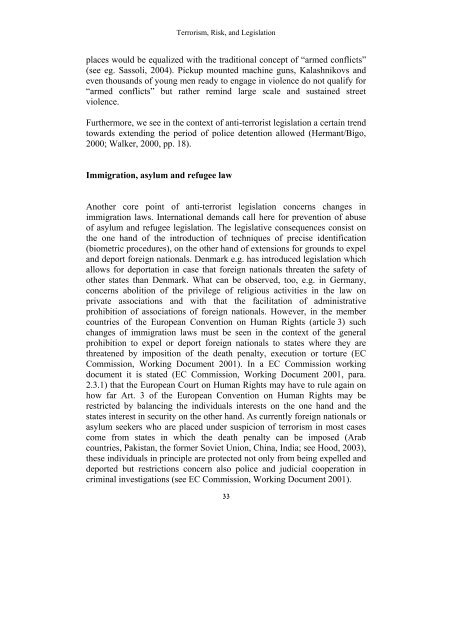222467to222472
222467to222472
222467to222472
You also want an ePaper? Increase the reach of your titles
YUMPU automatically turns print PDFs into web optimized ePapers that Google loves.
Terrorism, Risk, and Legislation<br />
places would be equalized with the traditional concept of “armed conflicts”<br />
(see eg. Sassoli, 2004). Pickup mounted machine guns, Kalashnikovs and<br />
even thousands of young men ready to engage in violence do not qualify for<br />
“armed conflicts” but rather remind large scale and sustained street<br />
violence.<br />
Furthermore, we see in the context of anti-terrorist legislation a certain trend<br />
towards extending the period of police detention allowed (Hermant/Bigo,<br />
2000; Walker, 2000, pp. 18).<br />
Immigration, asylum and refugee law<br />
Another core point of anti-terrorist legislation concerns changes in<br />
immigration laws. International demands call here for prevention of abuse<br />
of asylum and refugee legislation. The legislative consequences consist on<br />
the one hand of the introduction of techniques of precise identification<br />
(biometric procedures), on the other hand of extensions for grounds to expel<br />
and deport foreign nationals. Denmark e.g. has introduced legislation which<br />
allows for deportation in case that foreign nationals threaten the safety of<br />
other states than Denmark. What can be observed, too, e.g. in Germany,<br />
concerns abolition of the privilege of religious activities in the law on<br />
private associations and with that the facilitation of administrative<br />
prohibition of associations of foreign nationals. However, in the member<br />
countries of the European Convention on Human Rights (article 3) such<br />
changes of immigration laws must be seen in the context of the general<br />
prohibition to expel or deport foreign nationals to states where they are<br />
threatened by imposition of the death penalty, execution or torture (EC<br />
Commission, Working Document 2001). In a EC Commission working<br />
document it is stated (EC Commission, Working Document 2001, para.<br />
2.3.1) that the European Court on Human Rights may have to rule again on<br />
how far Art. 3 of the European Convention on Human Rights may be<br />
restricted by balancing the individuals interests on the one hand and the<br />
states interest in security on the other hand. As currently foreign nationals or<br />
asylum seekers who are placed under suspicion of terrorism in most cases<br />
come from states in which the death penalty can be imposed (Arab<br />
countries, Pakistan, the former Soviet Union, China, India; see Hood, 2003),<br />
these individuals in principle are protected not only from being expelled and<br />
deported but restrictions concern also police and judicial cooperation in<br />
criminal investigations (see EC Commission, Working Document 2001).<br />
33


